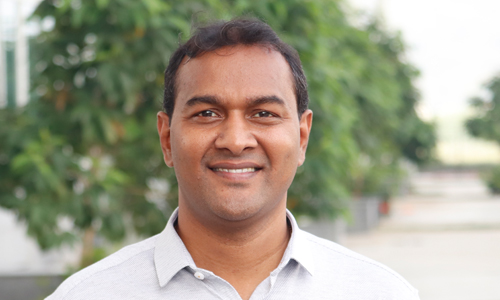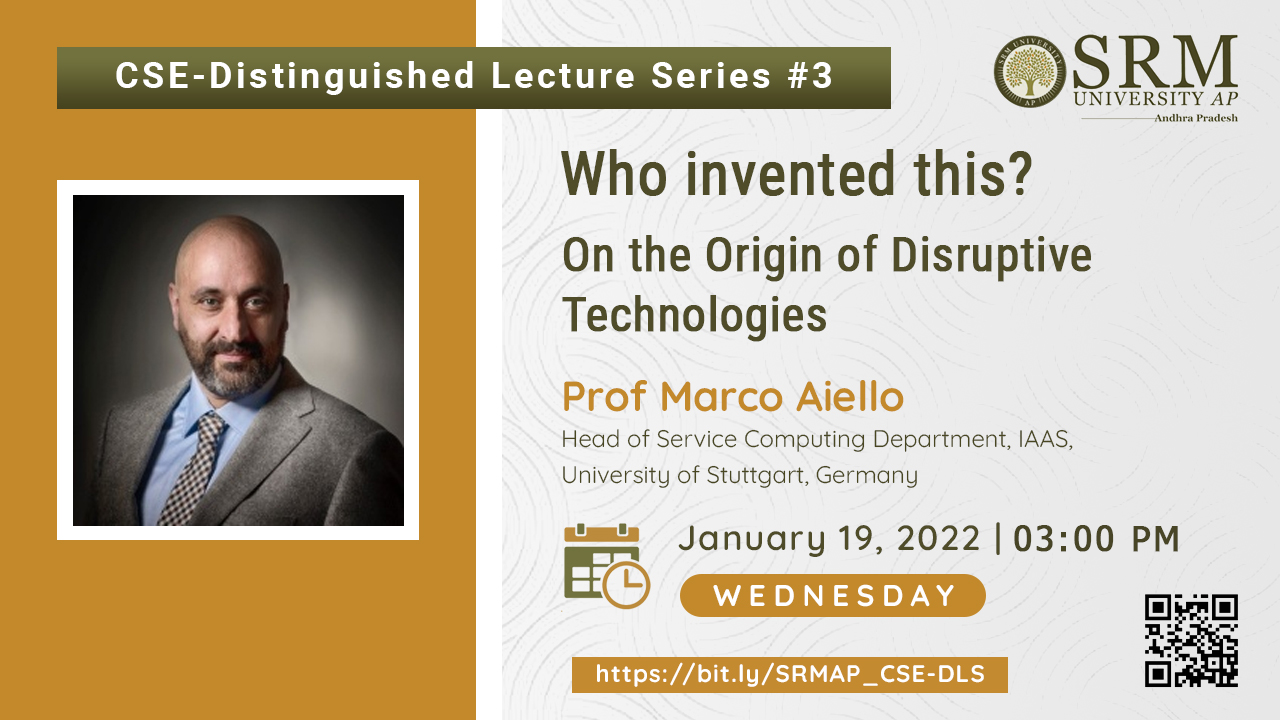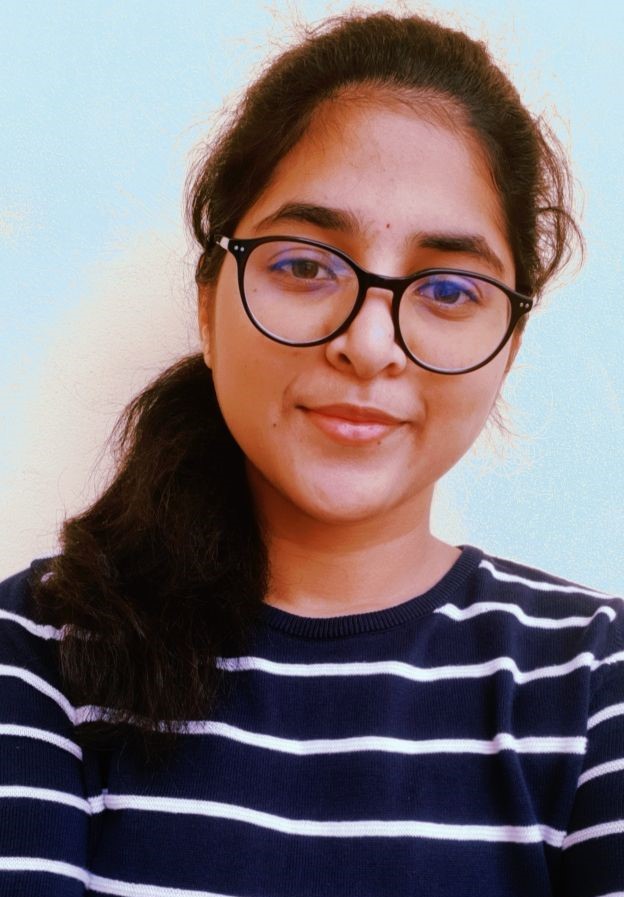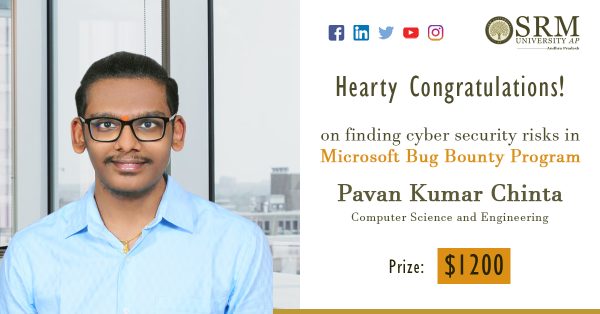- Dr Anil K. Suresh receives DBT grant for detoxifying sewage dyes at pilot scale December 17, 2021
 SRM University-AP is pleased to announce that Dr Anil K. Suresh, Associate Professor in the Department of Biological Sciences, has been awarded a DBT grant for his project entitled “Pilot-scale ultra-efficient fixative sewage dye-degradation by our ‘3D-megacatalyst’ generated using intact eggshell waste”.
SRM University-AP is pleased to announce that Dr Anil K. Suresh, Associate Professor in the Department of Biological Sciences, has been awarded a DBT grant for his project entitled “Pilot-scale ultra-efficient fixative sewage dye-degradation by our ‘3D-megacatalyst’ generated using intact eggshell waste”.About the Project:
Catalysis is widely used in various industrial and pharmaceutical processes to fasters the production of the desired end products. The use of inert matrices or frameworks is emerging as a “supported catalysts” arena with the potential for efficient reuse and recovery of the catalyst. We have recently generated a wide area supported catalyst utilising intact eggshell bio-waste, and the process is autogenic, facile, cost-efficient and entirely biodegradable. This supported megacatalyst can be effortlessly removed from the reaction by hand.
The current DBT-funding through Accelerated Translational Grant for Commercialization (ATGC) program is to support the technological reediness of our project for its commercialisation as a measure of Technology Readiness Level (TRL), an estimation technologies maturity and readiness for its utilisation in the commercial market. By demonstrating proof-of-concept laboratory studies, we are currently at TRL-6, and through this project, we will demonstrate pilot-scale studies for reaching the TRL-9 (Market/Operational level).
The main objectives of the proposal are:
1. Demonstrating large-volume degradations of sewage dyes at 500 L to 1000 Litres volume capacities in custom-built batch reactors.
2. Gram-scale hydrogenation of nitroarenes for the production of ~500 grams of pharmaceutical derivatives.
Social Implications of the project by Dr Anil K. Suresh:
Thousands of litres of harmful textile, paper sewage dyes that are corrosive and toxic to the environment and are unintendedly released can now be degraded into detoxified colourless by-products and water by using our “Au@megacatalyst”.
Pharmaceutically important precursors such as 4-aminophenol, propargyl amines can be produced in milligrams of quantities by using “Au@megacatalyst”, which otherwise are expensive and hard to synthesise. And most importantly, such precursors are currently being procured from China and other countries that can be avoided, and indigenous make-in-India can be conceptualised using our catalyst.
Dr Anil K. Suresh would be the principal investigator of this project, with a total outlay of Rs. 31 lacs over two years.
- Who invented this? On the origin of disruptive technologies December 16, 2021

The Department of Computer Science and Engineering at SRM University-AP is organising the third lecture in the Distinguished Lecture Series on January 19, 2022, at 03.00 pm through virtual mode.
Prof Dr Marco Aiello, Head of Service Computing Department, IAAS in the University of Stuttgart, Germany, will be the esteemed speaker elaborating on the topic “Who invented this? On the Origin of Disruptive Technologies”.
The birth and evolution of ICT have been constellated by radical and rapid innovation originating from all kinds of sources. The Internet resulted from an effort started by the American government, Bluetooth came from a large European company, and the Web sprouted from a personal project of a CERN employee. In this talk, I will pick from the short but incredibly dense history of ICT to reflect on the evolution of innovation under the lenses of amateurism versus large scale, professional designs. In doing so, my main attention will be devoted to the Internet, the Web, and Service-Oriented Architectures.
Biography of Prof Dr Marco Aiello, University of Stuttgart, Germany
Marco Aiello is a professor of Computer Science and Head of the Service Computing Department at the University of Stuttgart, Germany. An elected member of the European Academy of Sciences and Arts, he is an honorary professor of Distributed Systems at the University of Groningen, The Netherlands, where he was a faculty member from 2006 till 2018. He holds a PhD in Logic from the University of Amsterdam, the Habilitation in Applied Informatics from TU Wien, and a master degree in Engineering from the La Sapienza University of Rome. His research interests are in Service Computing, Smart Energy Systems, Smart Buildings, and Spatial Reasoning. He is a member of the Scientific Advisory Board for Informatics of the Lorentz Center, Leiden, The Netherlands and Steering committee Faculty of Exact Sciences, University of Modena and Reggio Emilia, Italy. He has been a board member of the start-up Nerdalize BV, The Netherlands and Visiting Fellow of Macquarie University, Australia.
He has authored over 190 peer-reviewed articles and several books, including two bestsellers, and the most recent “The Web Was Done by Amateurs: A Reflection on One of the Largest Collective Systems Ever Engineered” published by Springer-Nature. He is a steering committee chair of the Service-Oriented Computing and Applications (SOCA) Conference. He has delivered several invited/panel talks at reputed conferences and workshops. He is the Editorial Board of various reputed journals like Energy Informatics (Springer), Journal on Service-Oriented Computing and Applications (Springer), International Journal of Web Services Research (IJWSR), Annals of Computer Science and Information Systems. He was the Information Director of the Transactions on Computational Logic of the Association of Computing Machinery (ACM) from its foundation in 2000 until 2014. He has got several awards and recognitions. He has executed 12 research projects. Since 2006, he has been investigating Service-centric software engineering, Smart energy cities, Energy-aware buildings, Energy-aware data centres and many more.
Stay tuned, and don’t forget to participate in this invigorating session on January 19, 2022.
Continue reading → - Dr M Naveen Kumar December 14, 2021
- CSE student wins Best Paper award and cash prize in International conference December 14, 2021
 Padmaja Buggaveeti, an outstanding student from 3rd-year Computer Science Engineering at SRM University-AP, has won Best Paper (Third Prize) and a cash prize of Rs 10000 /- (Ten thousand rupees only) at the 4th ISEA Virtual International Conference on Security and Privacy 2021. Ms Padmaja, under the mentorship of her guide Dr V M Manikandan, presented a paper titled “A Novel Prediction Error Histogram Shifting-based Reversible Data Hiding Scheme for Medical Image Transmission” at the International Conference on Security and Privacy, sponsored by Information Security and Education Awareness Project Phase-II (ISEA-II) and organised by IIT (ISM) Dhanbad, India from October 27-30, 2021.
Padmaja Buggaveeti, an outstanding student from 3rd-year Computer Science Engineering at SRM University-AP, has won Best Paper (Third Prize) and a cash prize of Rs 10000 /- (Ten thousand rupees only) at the 4th ISEA Virtual International Conference on Security and Privacy 2021. Ms Padmaja, under the mentorship of her guide Dr V M Manikandan, presented a paper titled “A Novel Prediction Error Histogram Shifting-based Reversible Data Hiding Scheme for Medical Image Transmission” at the International Conference on Security and Privacy, sponsored by Information Security and Education Awareness Project Phase-II (ISEA-II) and organised by IIT (ISM) Dhanbad, India from October 27-30, 2021.Abstract: In this paper, Ms Padmaja proposed a new prediction error histogram shifting-based reversible data hiding scheme that ensures a high embedding rate and lossless image recovery. The pixels in the images are categorised into two different classes: white pixels and black pixels based on a checkerboard pattern. To predict the black pixel value for finding the prediction, they used the average of three pixels out of 4-neighbourhood pixels, which are very close to the central pixel value. The prediction error histogram is considered for further data hiding through the histogram shifting approach. An efficient overflow handling technique is used for this. The proposed algorithms were implemented using Matlab-2020, and the experimental study of the proposed scheme is carried out on the standard medical images and natural images.
International Conference on Security and Privacy is a premier conference focused on information security and privacy. This year’s conference was sponsored by Information security and Education Awareness Project Phase-II (ISEA-II) and organised by IIT (ISM) Dhanbad, India, from October 27-30, 2021.
Prize Details: Best Paper (Third Prize) and a cash prize of Rs. 10000 /- (Ten thousand rupees only).
Let’s hear what Ms Padmaja says about her achievement!
I thank Dr V M Manikandan, Assistant Professor in the Department of Computer Science and Engineering, for his valuable guidance in this research work. Winning the best paper award and cash prize in a reputed conference, ISEA-ISAP, has strikingly boosted my confidence to do research. I am grateful to all the faculty members of the CSE Department for their kind support and encouragement throughout my study at SRM University-AP.
Continue reading → - Cyber security enthusiast wins $1200 in Microsoft Bug Bounty Program December 10, 2021
 Taking your knowledge and solving real-world problems is the true intention of education. SRM University-AP is delighted to see Pavan Kumar Chinta achieve this aspiration and obtain $1200 Bounty from Microsoft Bug Bounty Program on November 13, 2021. The
Taking your knowledge and solving real-world problems is the true intention of education. SRM University-AP is delighted to see Pavan Kumar Chinta achieve this aspiration and obtain $1200 Bounty from Microsoft Bug Bounty Program on November 13, 2021. The
Bounty of $1200 was presented to Pavan by Mr Jason Pessemier, Microsoft Security Program Manager.Pavan Kumar Chinta has keen enthusiasm with Cyber Security as specialization in the Department of Computer Science and Engineering. Microsoft is not the only company that Pavan has managed to impress.
He has also reported Server-Side Request Forgery (SSRF) a high severity bug , in Mercedes Benz portal, and Groww by finding Broken Authentication and Security Misconfiguration. He was acknowledged by both the organisations and received swags from Groww.
Pavan has spared no space in his investigation of bugs. He was acknowledged by NCIIPC (A unit of NTRO), the Government of India, for discovering Sensitive Information Disclosure like PNR, Name, Mobile Number, etc., of the passengers in IRCTC’s authorised partner. He has also reported bug issues to GeeksforGeeks and Google.
Pavan expressed “Prof. T Ragunathan, (Associate Dean (Engineering) – School of Engineering and Sciences), guided me and encouraged to study the University’s Cyber Security structures as well. With constant guidance from Dr Priyanka, Assistant Professor, Computer Science Engineering, I was able to work with pentesting tools and develop reconnaissance methodologies. This lockdown helped me to discover and build myself. His short-term goal is to secure MAMAA (Meta, Apple, Microsoft, Amazon, and Google’s parent company, Alphabet).
This is an excellent start for a 3rd-year student. We hope to see the series of security risk investigations that began here to stay with him, and that he goes on to make tremendous achievements and makes the internet a safer space.
Continue reading →

